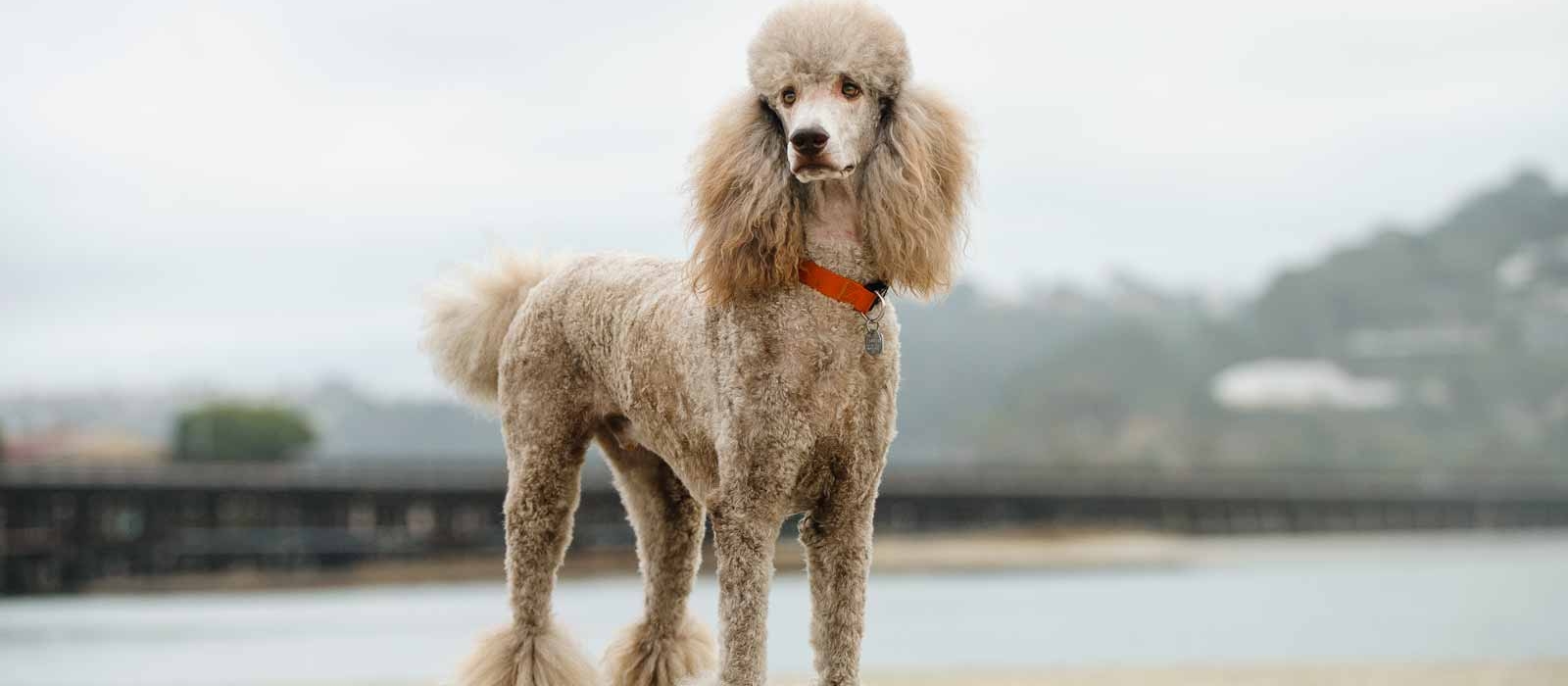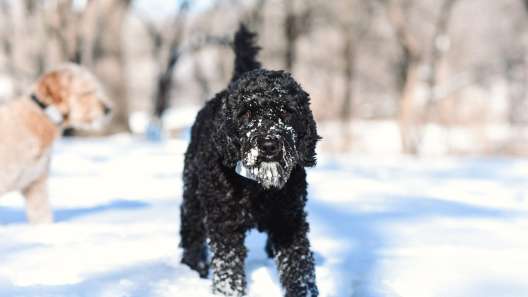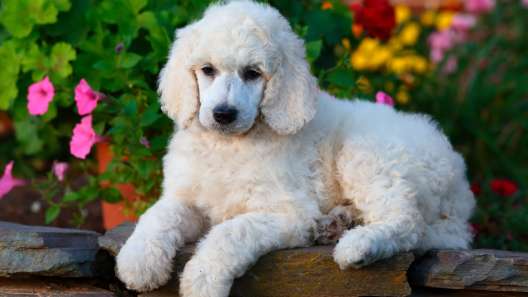-
Activity Level:
high
-
Shedding Level:
low
-
Grooming Level:
high
-
Trainability:
high
-
Good for Novice Owners:
high
-
Adaptability:
high
-
Kid/Pet Friendly:
often
-
Prey Drive:
moderate
-
Watchdog:
aware
- Average Size: Medium
- Average Lifespan: 10-18 years
- Registered?: aca, akc
Standard Poodle Dog Breed Information
Overview
Temperament
Adaptability
Health
Owner Experience
Grooming
Activity Level
Size
Life Span
Did You Know?
Although the Poodle is the national dog of France, they actually originated in Germany over 400 years ago where they were commonly used as a duck hunter. One of the facts about Poodles is that they were bred to be hunting dogs. Their curly coat protected them from the elements and they were bred for their excellent swimming skills, high intelligence, and incredible retrieval skills.
The Poodle is one of the most popular dog breeds and comes in three sizes – Standard, Miniature, and Toy. Throughout history, this dog breed has served many purposes. From living in the lap of luxury as companions to nobility to working out in the field as a valuable hunting companion to entertaining people in circuses around the world, the Poodle is right at home.
The American Kennel Club recognized the Poodle in 1887 as part of the Non-Sporting Group. Although they are more popular as a companion dog, the Poodle still maintains their athleticism and working dog instincts. As such, the Standard Poodle is the only member of the Non-Sporting Group that is also eligible for the AKC Retriever Hunting Tests.
Poodles are known for their intelligence, cheerful dispositions, and sensitive natures. They are versatile dogs that make great family companions and are considered one of the kid-friendly dog breeds. Well-socialized, they tend to get along well with children, other dogs, and other pets.
Due to their sensitive nature, they tend to be a better fit for older children who understand how to approach and interact with a dog appropriately. These dogs prefer peace and harmony in the household, so very young children who are too loud or rough can stress them out.
The Standard Poodle also tends to be quite energetic until they are about two years old. They can be prone to knocking over small children in their excitement. It’s a good idea to train your dog not to jump up when they are a puppy, especially because the Poodle grows into a larger dog.
Standard Poodles also tend to make great watchdogs and have some protective instincts. Well-socialized Poodles will bark to alert you, but will tend to be warm, open, and friendly with strangers. Without proper socialization, they can become skittish, nervous, and wary of strangers. Making sure any puppy is socialized early and often helps them grow into a confident, well-rounded dog.
Standard Poodles are highly adaptable dogs. Their energy level tends to make them better suited for larger homes with room for them to run. But, they can adapt well to apartment living as long as they receive the exercise, mental stimulation, and affection that they need.
They tend to do well in most climates. As with most dog breeds, they are sensitive to very hot and very cold weather. These are also in tune with their owners and thrive on human companionship and affection. As such, they do not like to be left alone for long periods of time.
Potential health concerns to be aware of in Poodles are epilepsy, Addison’s disease, von Willebrand’s disease, skin conditions, like sebaceous adenitis, eye disorders, Cushing’s disease, hypothyroidism, luxating patella, and hip dysplasia. Good breeding practices and the health of the parents make a big difference in the health of Standard Poodle puppies.
Reputable breeders will screen and test their dogs to ensure they are not passing preventable issues to puppies. Make sure you ask about the health and genetic history of both parents. You can also ask about any health tests or clearances that have been done. The national breed club recommends a hip evaluation, an ophthalmologist evaluation, a patella evaluation, two progressive retinal atrophy DNA tests (PRA-prcd, PRCD and PRA-rcd4), and a von Willebrand disease I DNA test (VWDI) at a minimum.
Because of their larger, barrel-chested body type, the Standard Poodle is also at a higher risk for bloat. Bloat in dogs can be dangerous and quickly becomes fatal if gastric torsion occurs (i.e.: the stomach flips). It’s important to know how to reduce the risk and what symptoms indicate it’s time to get to the emergency vet.
Poodles are one of the smartest dog breeds. They are highly intelligent, sensitive, and eager to please their owners. They are highly trainable, pick up on things quickly, and are a good fit for owners of any experience level.
In fact, they are considered one of the best dog breeds for first-time owners. They respond best to consistent, positive training techniques focused on rewards and praise. Even if you don’t need them for help with training, puppy training classes can still be a good idea for reinforcing training, bonding with your puppy, socializing them, and more.
Poodles are one of the fluffiest dog breeds. Their coats are curly or corded and come in a wide variety of colors. Although Poodles are known for their low/non-shedding, hypoallergenic coats, their coats still require a lot of maintenance. Your Standard Poodle’s coat needs to be trimmed, shampooed, and brushed frequently.
Daily brushing is required to remove tangles and prevent mats. Keeping your Poodle in a short clip can help reduce daily maintenance, but still requires regular professional grooming every 4-6 weeks to maintain it. A longer coat requires thorough daily brushing in order to prevent matting in addition to professional grooming every 4-6 weeks.
In addition to coat care, your Poodle’s nails, ears, and teeth will also need to be cared for. Regular professional grooming often helps with this, but you will still need to do some maintenance at home between visits. Nail trimming should be done once or twice monthly to keep nails from growing too long.
You should also be checking your dog’s ears on a weekly basis to make sure their ears are dry, clean, and free of debris. Dental care for dogs, like brushing teeth or using an enzyme toothpaste every day, is essential for protecting them from painful dental diseases later in life.
Since your Standard Poodle will grow into a large dog, it’s a good idea to get them used to these grooming tasks as a puppy. You, your dog, and your groomer will thank you for it! Who knows? If you make sure these experiences stay positive, they could even become a bonding time that your dog enjoys.
Although Poodles are part of the Non-Sporting Group and tend to be stereotyped as “frou-frou” dogs, especially because they are a popular show dog breed, they are actually quite athletic and are eager to be active. These are high-energy dogs that require a good amount of exercise and mental stimulation every day to be happy and healthy.
Daily walks, plus some playtime, time to run, and extra activity, are usually sufficient. But, these dogs will likely be up for more if you are. They are one of the dog breeds that tend to love water, which makes swimming a great low-impact activity.
Once they are fully grown and the vet has cleared them for more intense activities, you can try hiking, running, frisbee, and more. They love to stay busy and also tend to be a good fit for several dog sports such as agility, dock diving, obedience, flyball, tracking, and more.
Fully-grown Standard Poodles usually stand 22-27 inches tall at the shoulder and weigh 40-70 pounds. They can be slightly smaller than the average as the Standard Poodle size is denoted simply as being more than 15 inches tall at the shoulder.
Standard Poodles generally live for 10-18 years on average.
Poodles are known as the Caniche in France, which roughly translates to “duck dog”.









